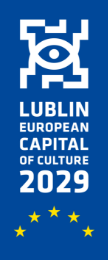Lublin / Re:Union – Marta Ryczkowska
The European Capital of Culture is a brand that has as many definitions as there are candidate cities in this almost 40-year-old competition. Each of the cities that held the title perceives it differently, from the perspective of its challenges, and plans for the future. Lublin is competing under the motto Re:Union, is richer in experience and the legacy of the process from 2011. The concept refers both to the Union of Lublin as a peaceful union of states, and to the European Union. In 2029, 25 years will have passed since Poland’s accession to the EU structures, which is a reason to reflect on the community and democratic values.
The key concept of the Lublin candidacy is reunification. Re:Union refers to the renewed dialogue of countries, the interpenetration of cultures, integrating diversity within one city and region, repairing broken ties with nature, and cultivating relationships with others, and oneself. The most important part of the Lublin bid is the process of recovering and generating connections. It is an difficult task in a polarized world and a divided community.
As part of the bid for EcoC, the team preparing the application takes care of development, internal networking, and joint reflection on the city in times of changes and crises. One of the activities was the establishment of the Cultural Union of the Lublin Metropolitan Area, covering the entire region in preparations for the ECoC. The expanded team is working on its models of city development, and new qualities of cultural policies. Another body that was established is the Consortium of Lublin Cultural Operators. It has been supporting the curatorial team in preparing the application program. The Consortium of Lublin Non-Governmental Organizations was also established. It takes care of the development of non-institutional culture in the context of the ECoC. An Academic Union was established between public and private universities in Lublin. The Business Union was also signed, a declaration of cooperation between the most important companies and enterprises in the Lublin region for the European Capital of Culture 2029. It intends to work together on the quality of cultural life in the city through the synergy of business and culture. The agreements are unique formats initiating joint activities that have not had a chance to exist in Lublin so far. The idea of Re:Union assumes both internal networking, related to environments and areas of urban activity, external networking, related to more dynamic functioning in the international arena. We are committed to defining a long-term European vision of local development through culture and creativity. Networks are the essence of European cooperation, the lifeblood of its culture. In the application process, Lublin joined Culture Next, a network of over 30 ECoC cities financed by European funds. Based on the experiences, processes, and collaborations established during the ECoC bid, the network, supports all cities in implementing culture-based local development programs and policies. Culture Next is also a commitment to ensuring the lasting impact and significant legacy of the ECoC program. As part of the network Lublin works with PolyLoop, a pilot project for monitoring and evaluating ECoC cities created by a British technology start-up. PolyLoop supports Culture Next in benchmarking the collective impact of member cities and harmonizing a set of indicators that can be aligned with the European Union and UN Sustainable Development Goals. Thanks to this, it is possible to examine the translation of EU guidelines into the operation of cities. Lublin also joined IETM, the largest and oldest network bringing together institutions and people professionally involved in broadly understood performing arts. We want Lublin to become a workplace of the most important artistic networks in 2029, to be able to enrich the program of urban activities with residencies, showcases, sessions, debates, and other manifestations of co-thinking and cooperation.
Re:Union is continuous work in the spirit of community regeneration. Strong relationships, awareness of one’s limitations, the need to support the grass-roots, independent culture of the city, and stimulating the residents in constant dialogue become key.
The article was published in the magazine Lubelski Informator Kulturalny ZOOM (7-8/2024).
